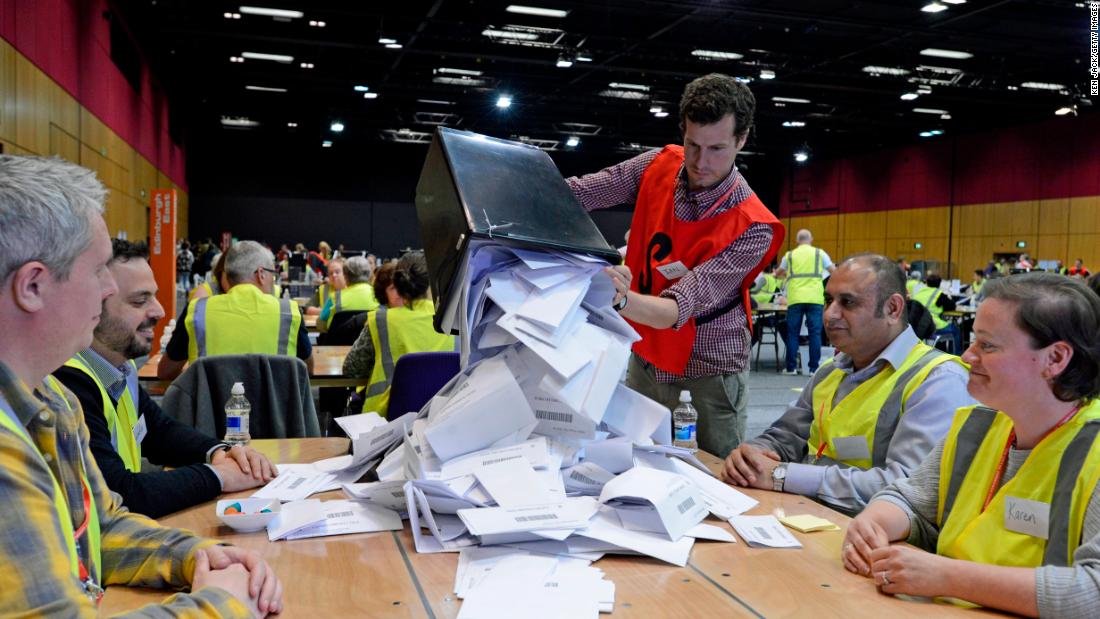London (CNN)If nothing else, Europe's fractured voters have made one thing clear -- they want things to change.
Updated 2028 GMT (0428 HKT) May 27, 2019

On Monday morning, as results for the European parliamentary elections rolled in, it emerged that millions of voters had abandoned the traditional parties which have dominated Europe's institutions for decades. Instead, they flocked to smaller groups like the Greens, the nationalists and the liberals.
In Germany, Chancellor Angela Merkel's coalition was soundly beaten, with the Greens scoring an astonishing second place. In France, Emmanuel Macron -- a leader who has repeatedly pitched himself as the man to take Europe forward -- was edged into second place by the nationalist Marine Le Pen. In the UK, support for the big two traditional parties, the Conservative Party and Labour, collapsed in favor of Nigel Farage's pro-Brexit party on one side, and a variety of anti-Brexit parties on the other. In Italy and Hungary, hardline populists triumphed.
Across Europe, turnout was projected to be above 50% -- a 25-year record.
Macron's pro-EU centrists will join a bloc of liberals -- set to be the third largest group in the Parliament -- that will soon wield enough power to dictate its vision of Europe to others. Predictions that nationalist politicians would become a dominant force inside the European Union have faded.
However, while these results are good news for those wanting to keep the EU alive, they are bad news for the political groups currently dominating Brussels.
The Greens and liberals do not sing from the same hymn sheet as the two parties that have dominated European politics for so long -- the center-right European People's Party (EPP) and center-left European Socialists (S&D). Like many Euroskeptics, Green and liberal parties also want to reform and renew Europe. As Guy Verhofstadt, the leader of the liberal group in the European Parliament recently told CNN: "We need a different union because this union will not survive the 21st century."
And although the nationalists and populists didn't perform as well as expected, their success is significant enough that it cannot be ignored. In Italy and France, two nations considered to be central to the EU's history, nationalists won.
In Italy, the far-right League, which is led by Deputy Prime Minister Matteo Salvini, finished a comfortable first. His success was matched in France, with Le Pen's National Rally estimated to have picked up 23.53% of the vote. And in Hungary, the populist Prime Minister Viktor Orban is celebrating a resounding victory, projected to be as high as 52%.
In the run up to the election, Salvini had publicly talked of his plan to build a pan-European right-wing alliance with the aim of reforming the EU on his terms, rather than copying the Brits and leaving. It remains unclear exactly how many MEPs he will be able to attract, but as things stand, Salvini's fellow travelers have not performed well enough for his dream to come true.
Europe has spent the best part of a decade dealing with populist surges on the radical left and the radical right. It has been a headache for EPP and S&D, who have gone toe-to-toe with populists with varying success.
That headache reached its apex on Sunday, as the EPP and S&D's grand coalition fell apart.
Europe's voters have spoken, but not with a single voice. The turnout of 50.95% across the EU was the highest since 1994, but the only clear message for Brussels is that Europe must reform if it is to survive. What that reform looks like is the next big battle to come.
The Parliament works by MEPs from different countries sitting in like-minded groups. Over the coming weeks, that horse-trading for power, as MEPs decide with whom they will sit, becomes crucial to the continent's future.
It's no secret that European politics is badly fragmented. These election results -- and the challenge they pose to building any kind of consensus -- accurately reflect the extreme divisions not only between the 28 EU member states, but the divisions within those nations.
So, it's a mixed message for Europe. How the leaders choose to interpret these results will have an immediate impact on key decisions that need to be made.
The European Commission needs a new president, as does the European Parliament. The new makeup of Europe and the decisions that are made off the back of these confusing results will have an enormous influence on both.
And although Brexit has been off the agenda for a little while now, Europe could have another big decision to make on October 31, the date that the UK's current Brexit extension runs out.
In the UK, where turnout was 37%, Brexit backlash finally whacked the two main parties.
The governing Conservatives have taken a hammering from Nigel Farage's new Brexit Party, while opposition Labour has been punished for not backing a second referendum. Both parties will have to make hard choices and consider shifting to either extreme end of the Brexit debate.
"There's a huge message here. Massive message here. The Labour and Conservative parties could learn a huge lesson tonight but I don't suppose they actually will," Farage said from Southampton, shortly after the vote.
Europe is stuck at a crossroads. The path forward seems foggier than ever, as European citizens seem unable to agree on very much of anything. The leaders of Europe can no longer afford to be complacent.
What these results show is that there is a leadership vacuum to be filled. The fight to do so will not be pretty.

